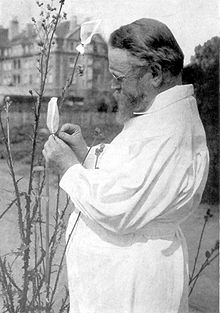

Non-Mendelian inheritance is any pattern in which traits do not segregate in accordance with Mendel's laws. These laws describe the inheritance of traits linked to single genes on chromosomes in the nucleus. In Mendelian inheritance, each parent contributes one of two possible alleles for a trait. If the genotypes of both parents in a genetic cross are known, Mendel's laws can be used to determine the distribution of phenotypes expected for the population of offspring. There are several situations in which the proportions of phenotypes observed in the progeny do not match the predicted values.
Certain inherited diseases and their presentation display non-Mendelian patterns, complicating making predictions from family history.[1]
- ^ Van Heyningen V, Yeyati PL (2004). "Mechanisms of non-Mendelian inheritance in genetic disease". Hum. Mol. Genet. 13 Spec No 2: R225–33. doi:10.1093/hmg/ddh254. PMID 15358729.